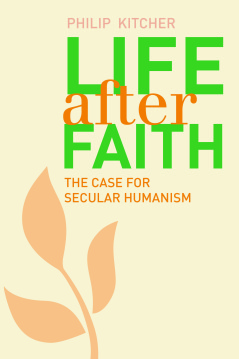A recent court ruling has reignited a long-running debate among Humanists: Is Humanism a religion?
Philip Kitcher, a professor of philosophy at Columbia University, suggests that whether or not you call it a religion, secular humanism can function like religion at its best—and perhaps even replace it.
Earlier this year, Kitcher spoke with Gary Gutting at The New York Times’s The Stone about this kind of Humanism. Now he’s published a thoughtful, thorough, and approachable book based on his 2013 Terry Lectures at Yale on the subject: Life After Faith: The Case for Secular Humanism.
The first part of our conversation—on his disagreements with “New Atheism,” how secular humanism is similar to religion and how it is different, and what Humanists can learn from religion—appears below. Check back tomorrow for the second part of our discussion, where Kitcher explores how to disentangle ethics from religion, the connection between Humanist values and community, and why doubt is just the beginning of Humanism. (Update: it’s now online.)
Chris Stedman: In the introduction to Life After Faith you say that you “resist the now dominant atheist idea that religion is noxious rubbish to be buried as deeply, as thoroughly, and as quickly as possible.” Why?
Philip Kitcher: For my entire adult life, I’ve been trying to figure out what I should say about religion. It came to a head for me in the wake of the resurgence of “New Atheists” in the early part of the century. Richard Dawkins, Daniel Dennett, Christopher Hitchens, Sam Harris—there’s much that I agree with in their books and presentations, but all of them seem to be missing some important things.
[tweetable]I think that the “New Atheist” critique has a very narrow view of religion.[/tweetable] For people like Dawkins, religion is all about people having false beliefs—and they think that when people have false beliefs, it’s better to correct their beliefs. I think in general that’s right, though having a misguided belief isn’t the worst thing that can happen to a person. [tweetable]But you can’t just leave things with “Well, we’ve now shown you why your traditional beliefs are false, enjoy yourselves and get on with it!”[/tweetable]
Dawkins would also rightly say that the forms of religion he attacks are the ones that cause the most violence and suffering in the contemporary world. But there are many people who practice less problematic—even socially valuable—forms of religion. It isn’t the end of the story to wipe out religious doctrine and say that’s the end of it. [tweetable]One must come to terms not only with religion’s history of problems, pain, and suffering, but also with its achievements.[/tweetable]
My perspective aims to widen the critique of religion, be more sympathetic to religion at its best, and strive towards finding a positive position that could replace religion. Some suggest that people never give up a perspective, however bad it may be, until they’ve got something to replace it. [tweetable]My fundamental difficulty with the “New Atheism” is that I don’t think it has supplied anything to replace religion.[/tweetable] Secular humanism tries to fill that gap. I wrote Life After Faith because I wanted to put the focus back on the positive: on secular humanism as a positive perspective on life.
CS: You argue that a secular perspective “can fulfill many of the important functions religion, at its best, has discharged.” How does secular humanism function in ways that are similar to some expressions of religion? How is it different? What can Humanists can learn from religion?
PK: [tweetable]For some religious people, religion is really all about values and not about specific doctrines.[/tweetable] By values I mean that they are genuinely concerned with human wellbeing and make great sacrifices to try to promote it. That’s a very important part of religion at its best. I grew up in Britain with a church that was much less interested in doctrine and dogma, and much more interested in social reform—in trying to help people live valuable lives. I respect that.
Practically, secular humanism can learn a lot from the ways in which religious communities have looked after the poor, looked after those who are suffering, tried to create a more humane world, and in general involved themselves in ethical projects. I think that’s admirable, and it’s something that the secular community is going to have to learn how to do as well.
CS: I love the book’s concluding lines: “A secular worldview ought to be forged in dialogue, even in passionate interaction, with all that has been most deeply thought about what it is to be human—including whatever can be refined out of religious traditions. [tweetable]For secular humanism is only secondarily secular; it is primarily humane.[/tweetable]”
PK: In a sense, that’s the credo of the entire book. Humanism is all about values—located in human beings, not in anything beyond us. [tweetable]We’re not important because we are the children of a divine being; we are just important.[/tweetable] And our lives matter when they connect with others, when they matter to others.
At times, dogma has inflicted massive, unnecessary suffering on many unfortunate people. That’s religion at its worst. But religion at its best is when other human beings, with all their faults and flaws and needs, come first—and when people work together to try to build a situation in which as many people as possible can live as well as possible. That’s secular humanism at its best, too.
Check back tomorrow for part two of our discussion.(Update: it’s now online.) This interview was edited for length and clarity.







